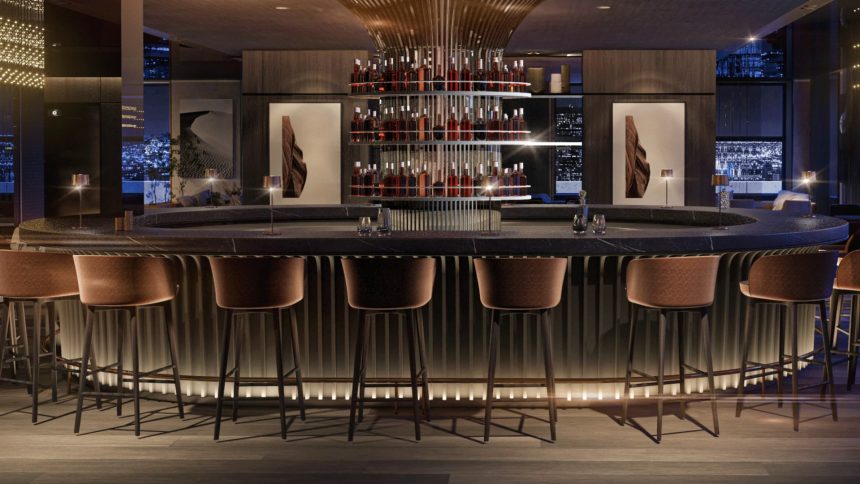A battle between elite membership clubs is about to reach a whole new level, as Core Club’s new 60,000-square-foot megaclub prepares to open in Manhattan next month.
The new Core space, spread over four floors above Midtown, is the latest in a wave of elite membership clubs that have opened in major cities since the pandemic. From Casa Cipriani and Zero Bond in New York, to the Aster and Heimat in Los Angeles and ZZ’s Club in Miami, the clubs have redefined the old-world membership clubs and created safe spaces for today’s privacy-minded, highly mobile wealthy.
More than a dozen new clubs have opened or announced plans to open in Manhattan since 2020. Some, like Aman, are offshoots of hotel brands. Others, like ZZ’s and Casa Cipriani, leverage the cult-like fan base of their restaurants. Many are geographic expansions of existing hotspots, like LA’s famed San Vicente Bungalows opening in New York.
The club boom has created an arms race of amenities, with clubs vying to outdo each other with dining spaces, celebrity chefs, wellness spas, gyms, bars, pools, nightclubs, plush hotel suites and high-tech board rooms. ZZ’s Club, owned by Major Food Group and scheduled to open in Hudson Yards this fall, will boast multiple restaurants and a “culinary concierge” — a team of chefs able to whip up any dish that it’s members request.
“No one’s ever done this before,” said Jeff Zalaznick, managing partner for Major Food Group. “We’ve got so much talent in this kitchen. If you want your mother’s meatloaf in two days, we can make it. You want fried chicken, we can make it and probably make a great version.”
The price for access is soaring: the Aman Club in Manhattan, part of Aman New York’s new 83-suite hotel, charges $200,000 for membership along with $15,000 a year in annual dues. Core’s memberships range from $15,000 for an individual membership to $100,000 for a family membership, along with annual dues of $15,000 to $18,000 a year.
With more clubs scheduled to open in the fourth quarter and beginning of next year, some members worry that New York and other big cities are becoming over-saturated with club offerings, especially if the economy plunges into recession.
Club owners and managers say they see no slowdown in demand, as the wealthy seek communities and private spaces where they can work, play, stay and network in a secure and exclusive space.
Industry watchers say the U.S. may be moving toward the London model of social clubs, where storied institutions like Annabel’s, 5 Hertford Street and White’s play a central role in the social and professional lives of the upper crust. Soho House, founded in London in 1995 by restauranteur Nick Jones, has expanded to become the global goliath of the private club world, with dozens of locations around the world and a publicly traded stock.
Core Club’s founder and CEO, Jennie Enterprise, said that after the pandemic, the wealthy value privacy and a sense of community more than ever.
“I think the proliferation of private clubs is a reflection of an exceptional business model,” she said. “The annuity subscription-based business model in any industry is attractive. The activity in the space certainly reflects a desire for curated communities and experiences. And probably with a dynamic of social media, and a lack of privacy, I think that discretion and private communities are probably something that is more aligned with the culture of the moment.”
Club owners say members often join multiple clubs, since each has its own focus and atmosphere. Zero Bond, founded by nightclub impresario Scott Sartiano, has more of a nightclub vibe and has hosted Kim Kardashian, Pete Davidson and Gigi Hadid. Aman has the hushed (some say eerily quiet) feel of a zen resort, while Casa Cipriani features the flashy, people-watching theater of Cipriani’s storied New York eateries.
Zalaznick said his affluent clientele is “spending more than ever” at ZZ’s Club in Miami and the company’s high-end restaurants, which bodes well for the forthcoming ZZ’s Club New York.
“The things that bring people back are great food, great service, great experiences, great connections and the staff’s ability to cater to people’s needs or desires,” he said. “That’s our focus, and that’s what will give us longevity in the club space.”
Core gave CNBC an exclusive first tour of its new club at 711 Fifth Avenue, scheduled to open in mid-October. The group opened its first space in 2005 at a nearby location on 55th street and became the most successful of the new breed of modern, business-oriented membership clubs. In need of more space and a fresh look, Core leased four floors on the top of the former Coca-Cola building and spent two years and tens of millions of dollars building the ideal layout.
Spanning the 15th through 18th floors, Core has over 6,000 square feet of outdoor terrace space with views of Central Park and the glass towers of Midtown.
The 15th floor houses 11 luxury hotel suites, which are between 500 and 750 square feet apiece. Priced at around $1,500 per night, the rooms will be available for guests or their family members. The same floor also houses a spa with treatment rooms and a salon.
The 16th floor is home to the gym, juice bar and the Dangene Institute, which features the latest in anti-aging skincare technology.
On the 17th floor, members will find a speakeasy-style lounge, which includes a stylish bar, blue velvet couches and a glass wine and champagne vault, called the wine library. Another set of glass doors leads to the culinary lab, a U-shaped table where celebrity chefs from around the world will serve up special dishes for members.
The 18th floor houses the more formal dining area, which will serve mostly Mediterranean fare during the day and a more seasonal, varied menu at night. Core’s culinary program is headed by Chef Michele Brogioni, the celebrated former executive chef at Giorgio Armani. The club’s bread and pastries (including what is arguably New York’s best lemon cake) is overseen by head pastry chef Mauro Pompili.
The 18th floor also houses state-of-the art conference and board rooms, a screening room and a flexible events space and gallery that can be used for exhibits, parties and big gatherings.
Along with the Manhattan club, Core has new locations in Milan and San Francisco and has plans for several others in the coming years, Enterprise said.
Yet Core’s main draw, she said, isn’t the spaces or the amenities, but the community and well-spring of ideas. Core produces between 150 and 200 cultural events a year, from performances, exhibits and talks, to tastings, interviews and showcases.
“We’re ideas-led, not amenities-led,” Enterprise said. “Clearly we have beautiful, world-class amenities. But what defines us is the quality of our ideas. We curate a community of relentlessly curious and like-minded people from across the spectrum. So people can intersect with other people from media sports, fashion, finance, science, technology, design and beyond. Our commitment to cultural programming reflects a desire for our members to endlessly cultivate themselves.”
While Core never discloses the names of any of its members, some cited in past media reports include Blackstone CEO Stephen Schwarzman, NFL Commissioner Roger Goodell, fashion designer Tory Burch, Vornado CEO Steven Roth and Estee Lauder Executive Chairman William Lauder.
Since the new location is nearly twice the size as its prior outpost and can accommodate more members, Core is accepting and starting to review new applications.
“We are getting a lot of applications,” Enterprise said. “There is no single requirement. We look for interesting, curious people who will add to the community.”
Read the full article here




